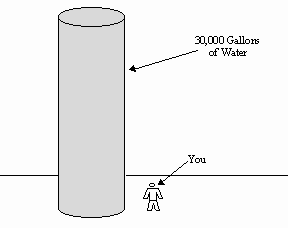  |

This is a chapter from the book The Teenager's Guide to the Real World by Marshall Brain, ISBN 1-9657430-3-9. For more information on the book please click here.
Chapter 37: Life Is Short
Most teenagers feel they are immortal. That is one of the great advantages of being a teenager (see Chapter 16). This feeling of immortality will last perhaps into your 20s, then it will vanish as reality sets in. Since it is impossible, I won’t attempt to convince you that you, too, will one day be 60 or 80. Or even 30. However, let me try to give you an analogy to help you understand why you feel the way you do about life.
Let’s say you are standing in a desert. You are standing next to a gigantic tank that holds 30,000 gallons of water. The tank is 11 or 12 feet in diameter and about 40 feet tall. The tank is full to the brim. This is your drinking water. Every day you drink about a gallon of water.
Let’s say that someone walks up to you and says, "Hey, can I have a gallon of water?" Your response would probably be, "Sure, why not?" In fact, if someone asked you for 100 gallons of water, your reaction might be the same. You’ve got 30,000 gallons after all, and there is nothing for you to do with it but drink it. What do you care? If you spill a little water, it doesn’t matter either.
As you go through life drinking about a gallon of water a day, you begin to notice something. Each day it doesn’t seem like you are taking anything out of the tank, but over time you can see that the level in the tank is getting lower. You look in one day and the tank is only half-full. Then it is only a quarter full. Then there is only an inch in the bottom of the tank. At that point, how much would a gallon of water be worth to you? Quite a bit, because now you can see that your water is scarce: you can see the end of the supply looming in the near future. One fateful day you extract the last drop from the tank, and you realize that today is the day you will die. You are, after all, standing in a desert. And that night you die.
The number 30,000 is significant. If you assume you will live to be about 82, there are 30,000 days in your life. Right now your tank of water is full. If you are 15 you have only used about 5,500 gallons, so water seems to be plentiful. In fact, the supply of water seems to be infinite and you feel immortal. However, each day you live you drink a gallon from your tank, and there is no way to add any more once you use it.

The following sections look at the three most common ways for people to waste life.
Smoking is StupidOne of the best ways to shorten your life is to smoke. If you take up smoking as a teenager, you might spill perhaps 10,000 of your 30,000 gallons of water.
Ask any adult what they think about smoking. Any adult, smoker or non. If you ask non-smokers, what they will tell you is that smoking is a bad habit. If you ask smokers, they will also tell you is that smoking is a bad habit and they wish they never started. You really should try this—go to an office building where there are older smokers standing outside and ask them what they think about the habit. You will learn a lot.
Imagine that I come up to you one day at school and we have the following conversation:
You: Fine.
Me: Hey, I’ve got this new thing I’d like you to try.
You: Tell me more.
Me: Well, it’s a pill I think you will want to start taking.
You: What does this pill do?
Me: First of all, it is a known carcinogen. It is extremely likely you will get lung cancer due to this pill, for example. It is going to cause a lot of other short- and long-term health problems as well. It will make your breath, hair and clothes stink. It will make a mess of your car. You will take this pill about 40 times a day. This pill, by the way, is addictive. Once you start taking it, it will be extremely difficult to stop. And a supply of pills will cost about $2 to $4 a day, depending on where you buy them.
You: I have to pay for this??? Are you kidding??? This pill sounds absolutely disgusting!!! Why in the world would I want to take it???"
Me: It will make you think you are cool.
You: Oh, well, why didn’t you say so? Sign me up! Where can I get some???
- An average smoker who starts at age 15, dies at age 60 and smokes two packs a day will consume 657,000 cigarettes. 657,000 cigarette butts is disgusting.
- Assume each cigarette costs a nickel, and assume the money wasted on cigarettes was instead deposited in a mutual fund earning 10%. The value of the money wasted on cigarettes during a lifetime is about $500,000. If you assume cigarettes cost a dime each the value exceeds $1,000,000. There must be a better way to spend that money.
[For more information on smoking, see this article]
TV is a Wasteland
- The rate of information transfer for TV is very low when compared to the data rate for reading. For example, the transcript for an hour-long educational show like Nova is very thin, and you can read it in 10 or 20 minutes. If you want to learn something, it is almost always faster to read about it. If you want to know what is happening in the world, read the newspaper. It is always much more detailed than the TV news and you can control exactly what you read.
- Most of the stuff on TV is incredibly mindless crap that has no value. It is either harmless but a total waste of time, or it is harmful. It is harmful when it repeatedly injects negative thoughts into your brain. For example, a typical child is exposed to 8,000 murders on television by the time he or she finishes elementary school. A typical teenager sees 200,000 acts of violence on TV by age 18. The vast majority of people in normal life are exposed to zero murders and very few violent acts. TV makes violence seem normal and acceptable. What value does that have?
- TV transmits commercials that lead you to buy things you would neither want nor need in the absence of TV. These items are a waste. See Chapter 29 for details.
 This quote was made by FCC chairman Newton N. Minow to the National Association of Broadcasters. What is funny about this quote is the fact that it was made in 1961. If anything, TV has gotten worse rather than better since then.
This quote was made by FCC chairman Newton N. Minow to the National Association of Broadcasters. What is funny about this quote is the fact that it was made in 1961. If anything, TV has gotten worse rather than better since then.The average American spends about 2 hours a day watching TV. That is the equivalent of over 18 weeks of 8-hour days. This is time, and life, that is completely wasted. Read instead, take a walk, get a part-time job, learn to play an instrument, create a work of art, talk to other people, take up a sport (see Chapter 36) or do anything constructive. Eighteen weeks of 8-hour days is a gigantic amount of time, and you would be amazed at what you could accomplish if you used that time constructively. If you stop watching TV today and use the newly free time in a productive way, you can begin being far more successful in life.
The following facts are published by an organization called TV-free America (http://www.essential.org/tvfa/). They are enlightening:
- Number of 30-second commercials seen in a year by an average child: 20,000
- Number of minutes per week that parents spend in meaningful conversation with their children: 38.5
- Number of minutes per week that the average child watches television: 1,680
- Percentage of children ages 6-17 who have TVs in their bedrooms: 50
- Percentage of day care centers that use TV during a typical day: 70
- Hours per year the average American youth spends in school: 900 hours
- Hours per year the average American youth watches television: 1500
- Percentage of Americans that regularly watch television while eating dinner: 66
- Number of murders seen on TV by the time an average child finishes elementary school: 8,000
- Number of violent acts seen on TV by age 18: 200,000
- Percentage of Americans who believe TV violence helps precipitate real life mayhem: 79
Simply stop watching television. It will be hard at first. You may not be able to comprehend life without TV, but after a few months your head will clear and you will find that you enjoy life a whole lot more. Try it and see.
Drugs are Worthless
The promise of drugs is a "high" or a "feeling of euphoria." For example, heroin causes a euphoric "rush." I have heard it described as "better than sex." I have heard it described as "like being in heaven." All kinds of things. The problem is that the feeling always comes at a cost once the high ends. The cost is a feeling of depression of greater magnitude. You cannot have the high without the despair or depression. You can safely ignore anyone who tells you otherwise. So you are forced to either maintain the high or absorb the despair. Unfortunately, the despair lasts far longer than the high does. So what have you gained?
Drugs are a lot different from sex, and they certainly are not "better than sex." If you have a wonderful night of passion with your spouse, you will feel very good for a long time afterward. Drugs are nothing like this. With drugs you get a rush, then you crash and burn. The only way out is to take the drug again. This is why you see people on cocaine binges or week-long sessions with amphetamines. To stop means despair.
What, you might ask, is the point? If the high is always followed by despair, what have you gained? In fact, you have lost. The euphoria is addictive and causes you to crave it.
There simply is no value, or point, in getting started with drugs. Simply walk away from the people who tell you otherwise.
Return to the table of contents for The Teenager's Guide to the Real World
This is a chapter from the book The Teenager's Guide to the Real World, ISBN 1-9657430-3-9, published by BYG Publishing, Inc. For more information on ordering a copy of the book, click here.

BYG Publishing, Inc.
(888)294-7820 - P.O. Box 40492 - Raleigh, NC 27629 - http://www.bygpub.com
Questions or comments, email:
questions@bygpub.com
© 1997 BYG Publishing, Inc. All rights reserved.